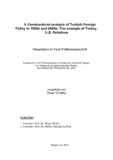Citation link:
https://nbn-resolving.org/urn:nbn:de:hbz:467-9088Files in This Item:
| File | Description | Size | Format | |
|---|---|---|---|---|
| Dissertation_Oemer_Yilmaz.pdf | 3.3 MB | Adobe PDF |  View/Open |
| Dokument Type: | Doctoral Thesis | metadata.dc.title: | A constructivist analysis of Turkish foreign policy in 1980s and 2000s : the example of Turkey-U.S. relations Eine konstruktivistische Analyse der türkischen Außenpolitik in den 1980er Jahren und 2000er Jahren : das Beispiel der Türkei-USA Beziehungen |
Authors: | Yilmaz, Ömer | Institute: | Fakultät I Philosophische Fakultät | Free keywords: | Türkische Außenpolitik, Erdogan, Özal, Turkish foreign policy, Erdogan, Ã zal | Dewey Decimal Classification: | 320 Politik | GHBS-Clases: | PDXV | Issue Date: | 2014 | Publish Date: | 2015 | Abstract: | In this study, Turkish foreign policy (FP) during the Özal (1983-1993) and Erdoğan eras (2003-2012) is comparatively analyzed. There are two main motivations in conducting this research. The first one is related to the arguments that the Erdoğan leadership has been pursuing a novel FP line compared to the past experiences of the Turkish Republic. This study suggests that even if it is an advanced form based on a serious theoretical and conceptual ground, the Erdoğan leadership´s FP is an extension of Özal leadership´s FP line. Considering their common goals to make Turkey first a regional and later a global actor, it is hypothesized that both leaderships have pragmatically evaluated Turkey´s potential in accordance with their identity definitions and shaped their FP approaches and practices according to their identity perceptions and paradigms. It is also hypothesized in this respect that similar identities bring about similar FP understandings and practices. Therefore, the second goal of the dissertation is to employ constructivism with its identity-oriented brand so as to explain Turkish FP in two different time periods. In this context, the social construction processes of both leaderships´ identities have been particularly highlighted. Subsequently, the FP approaches and the corresponding FP principles in both eras have been discussed and the impact of identity on their FP understandings as well as policy practices has been studied. With a view to analyzing the reflection of these FP approaches and principles to the practical level, bilateral relations between the USA and Turkey are elaborated with an eye to these two allies´ common interests in the Middle East, Balkans and Central Asia. In this manner, while this study seeks to demonstrate the similarities in terms of FP approaches and policy practices of both Özal and Erdoğan leaderships, it aims to explain the differences at the practical level again from a constructivist point of view. The last goal of this thesis is to make an academic contribution to the literature by suggesting the accuracy of the holistic constructivist approach to explain the FP practices and find out their roots. Holistic constructivism seeks to take the domestic and international as two faces of a single social order and underlines the importance of accommodating all factors affecting the identities and interests of state. Thus, this dissertation proposes that FP of a country, like Turkey, cannot be analyzed only with the role of agents. Even if these agents might be extraordinarily influential, other factors such as structure might be also determining. However, the bottom line here is how the agents see and perceive the structure as well as other determining factors of FP and define the course of FP of their countries. In dieser Studie wird die türkische Außenpolitik während der Özal- (1983-1993) und Erdoğan-Epochen (2003-2012) vergleichend analysiert. Es gibt zwei Hauptmotive bei der Durchführung dieser Forschung. Die erste bezieht sich auf das Argument, das die Erdoğan-Fürhung eine neuartige außenpolitische Linie im Vergleich zu den bisherigen Erfahrungen der türkischen Republik verfolgt. Diese Studie weist darauf hin, dass die außenpolitischen Prinzipien und ihre Anwendung unter Erdoğan weitgehend eine Erweiterung der außenpolitischen Linie Özals darstellen. An dieser Stelle wird hervorgehoben, dass ein ähnliches politisches Selbstverständnis eine entscheidende Rolle für ähnliche Konzepte und Handelungen in der Außenpolitik spielen. |
URN: | urn:nbn:de:hbz:467-9088 | URI: | https://dspace.ub.uni-siegen.de/handle/ubsi/908 | License: | https://dspace.ub.uni-siegen.de/static/license.txt |
| Appears in Collections: | Hochschulschriften |
This item is protected by original copyright |
Page view(s)
1,298
checked on Nov 25, 2024
Download(s)
748
checked on Nov 25, 2024
Google ScholarTM
Check
Items in DSpace are protected by copyright, with all rights reserved, unless otherwise indicated.

